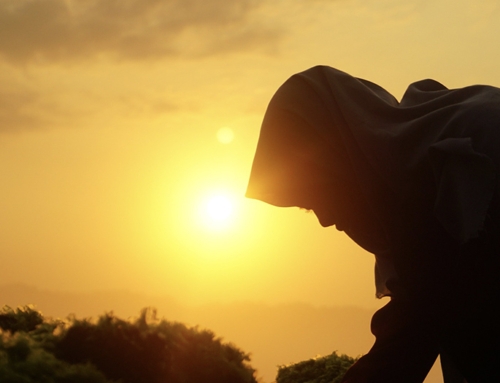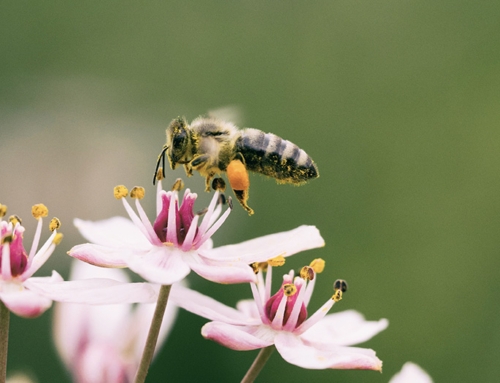By: Melissa Barreto
A Journey of Faith: From No Religion to Islam.
I grew up without religion.
My parents were raised Catholic. There were faint signs of it at home — necklaces with saints in the back of the jewelry drawer, a dusty yet decorative statue of the Virgin Mary that was passed down from a relative, and a very old bible tucked into a shoebox that no one ever talked about.
Other than that, religion was neither a discussion nor an active practice in our home. I was never baptized. I never went to Sunday school. Our family didn’t attend church or participate in faith-based community events. No one in our house said prayers before bed or grace before we ate.
My Journey from Curiosity to Faith: How I found Islam.
Yet somehow, I always felt like there was something more, something far beyond and greater than myself.
I never considered myself an active searcher. Religion was more of a curiosity than anything else. When I finally came to Islam, it wasn’t because of a dramatic ‘aha’ moment but a slow unfolding of conversations, information, and realizations that happened over time.
How I Found Peace and Meaning in Islam after Being Frustrated With Other Faiths.
A lot of it began out of sheer frustration with other faith practices. As a young adult, many of my peers and colleagues subscribed to a variety of belief systems and it was through discussions with them that I got tastes of different faith concepts. But there were always ideas that I struggled to accept as true or spiritually uplifting.
When Islam entered the picture, so many concepts I struggled with in other faiths all of a sudden had direct and reasonable responses. Over time, one by one, my arguments against faith were countered and quieted by the Quran and teachings of the Prophet Muhammad, peace and blessings be upon him.
If You’re Questioning Your Faith’s Concept of God…
Many ideas of God never resonated with me before Islam.
The trinity was a big one that I couldn’t wrap my head around — God is the only God but Jesus is also God, but he’s also God’s son? The Holy Spirit is God too, just in another form. All three forms are unique and distinct, but all are God?
I remember friends and peers trying to explain the trinity to me through illustrations of an egg or the water cycle, whole systems in their own right but made of different parts and able to transform from one thing to another. To me, it was just complicated.
In Islam, the explanation is clear and simple: God is One, Unique, and completely unlike His creation.
The Quran says: “Say, ‘He is God the One, God the eternal. He begot no one nor was He begotten. No one is comparable to Him.’” (112:1-4)
The idea of God’s Oneness and Uniqueness is a foundational principal in Islam and understanding it automatically ruled out other concepts of God that I struggled with, including the idea of worshipping more than one God, God having family members or partners, worshipping any other being claiming to be God in some other form, and the ideas of God being distinctly male or female.
If You’re Questioning Your Faith’s Concept of Prayer…
“Why do you pray to Mary (the mother of Jesus)?” I used to ask my Catholic friends. “If you believe that God is the One in control, then why call on Mary for help? Or a saint? Or confess to a priest? Why not just ask God directly?”
My friends usually replied with one of two things: either they “just do” and didn’t really know why or they believed that these individuals were so great and pure during their lives that praying to them would help their prayers to be accepted.
“But why do you need help to pray to God?” I would follow up. “If you believe that God loves you, why wouldn’t he want to accept your prayers directly?”
I couldn’t accept the idea that a Loving, Forgiving, Merciful God would create us to worship Him and then not want to hear from us directly or not want to accept our prayers without someone else to speak on our behalf.
In Islam, worship is exercised directly between a believer and the Creator. When we supplicate, we do so directly to God. When we prostrate in our daily prayers, we dedicate that prayer to God alone.
Allah (God) is the One who created us, Who Knows what is in our hearts and minds, Who is All-Seeing and Hearing of everything that we go through. For a Muslim, there is no need to send prayers to or through any other person in order for God to answer us.
It’s mentioned in the Quran: “And your Lord says, ‘Call upon Me; I will respond to you.’” (Quran 40:60)
Even when we’ve done wrong, never, ever are we so flawed, broken, or wandering from the path, that we cannot turn things around by speaking directly to God and asking for forgiveness and guidance.
The Prophet Muhammad, peace and blessings be upon him, said that Allah said: “…Whoever draws close to Me by the length of a hand, I will draw close to him by the length of an arm. Whoever draws close to Me by the length of an arm, I will draw close to him by the length of a fathom. Whoever comes to Me walking, I will come to him running. Whoever meets Me with enough sins to fill the earth, not associating any partners with Me, I will meet him with as much forgiveness.” (Hadith Qudsi, Sahih Muslim)
If You’re Questioning the Validity of Your Holy Book…
I was nearly a senior in college when I first learned that the Bible had been changed over time. Not just reprinted with more modern translations but physically altered over the centuries. Found parts had been added, other parts had been removed, and to this day historians still question the authenticity of the author/s.
None of this sat well with me. How could I believe in a scripture that was not intact as it was revealed? How could I reference a book as a spiritual guide for my life if the contents were no longer the same as what was revealed by God?
Islam answered that for me with the Qur’an.
The Noble Qur’an was revealed to the Prophet Muhammad, peace and blessings be upon him, over 1,400 years ago. It was originally revealed in Arabic, and though you can find it translated into many other languages today, the original Arabic version has been preserved as it was revealed and recited by the Prophet, word for word, and letter to letter. That same text is also memorized by millions of Muslims around the world, in part and in full.
Not only is it considered a well-documented historical marvel but a spiritual miracle among Muslims and an ever-living challenge from God to anyone who thinks they can create anything like it.
The Qur’an says: “And if you are in doubt concerning that which We reveal unto Our slave (Muhammad) then produce a Surah (chapter) of the like thereof, and call your witnesses besides Allah if you are truthful.” (Qur’an, 2:23)
If You’re Questioning Your Faith’s Regard for Women…
I never understood why some faiths put all the blame on Eve for the apple incident. Or why in other faiths women are not allowed to divorce or choose their own husbands. Or why normal biological things that happen to a woman (menses, childbirth, etc.) are seen as spiritual punishments on all of womankind. Or why some faiths could ever consider women as being inherently or spiritually inferior to men.
For women, and young girls, ideas such as these are incredibly frustrating and can be damaging both spiritually and psychologically. Why would any woman want to follow a faith that degrades and belittles her?
Islam holds a very different position towards women. Considering the time period of the Quran’s revelation (early Middle Ages), Islam’s ideas about women are surprisingly advanced for their time, and at the time they shook at the foundations of the male-dominated Arab society which mainly viewed women as personal property.
In Islam, women:
- Are considered spiritual and intellectual equals to men
- Are not accountable for anyone’s sins other than their own
- Can choose their own husbands and seek divorce
- Can maintain and be in charge of their own property, work and wealth
- Are upheld as important figures in society, deserving of care and respect
- Are not considered inferior for biological differences that God created them with
- Are urged to observe the same spiritual practices as men, including worship, charity, modesty, prayer, fasting, Hajj, reading Qur’an, seeking knowledge, and maintaining good family ties
- Have a long history of holding important positions and participating in all areas of Islamic society, including religious teaching, government, business, medicine, politics, and more.
If You’re Questioning the Fact that You Have Questions
When I first started learning about Islam, I had so many questions. And I was never told “you shouldn’t ask that.”
No question was off limits. No curiosity was too much. There were definitely times I was told “I don’t know” or “I don’t want to say the wrong thing” but I was always referred to some other Muslim who did know or who could find out with certainty and get back to me, or who would gift me a book to read more on my own.
This was a stark contrast to my experience with people of other faiths. So often I was told by others “you ask too many questions” or “those kinds of questions aren’t okay” or “you just have to believe.” It’s like I was being shut down for being curious, for trying to understand. Yes, I yearned for faith, but blind faith was something that I refused to ascribe to.
Once again, Islam was different.
In Islam, questioning and reflection are encouraged. Many verses in the Quran ask us to question our lives, our surroundings, our biases, and our character.
“Have you considered the water you drink?” (56:68)
“Man should reflect on what he was created from.” (Quran 86:5)
We are repeatedly told to use our God-given intellect, to pay attention, and think!
“Will they not, then, ponder over this Quran? – or are there locks upon their hearts? (Quran, 47:24)
“Thus Allah (God) explains His signs to you, so you may use your reason.” (Quran 2:242)
Your Heart is Looking for Something More. Let Islam Answer Your Questions.
Challenging the beliefs and ideas you grew up with is not easy, even when those beliefs don’t belong to anything in particular. But the fact that you’re questioning should not be ignored. It could be a sign that your heart is looking for something more. And like it did so many times for me, Islam could have an answer for you.
Have a question about Islam? Ask a Muslim!
Melissa Barreto is a home educating mother of five and the Co-Founder of Wildflower Homeschool Collective, a homeschool organization based in Northern New Jersey.
Got Questions?
We have Answers. Get in touch now.








